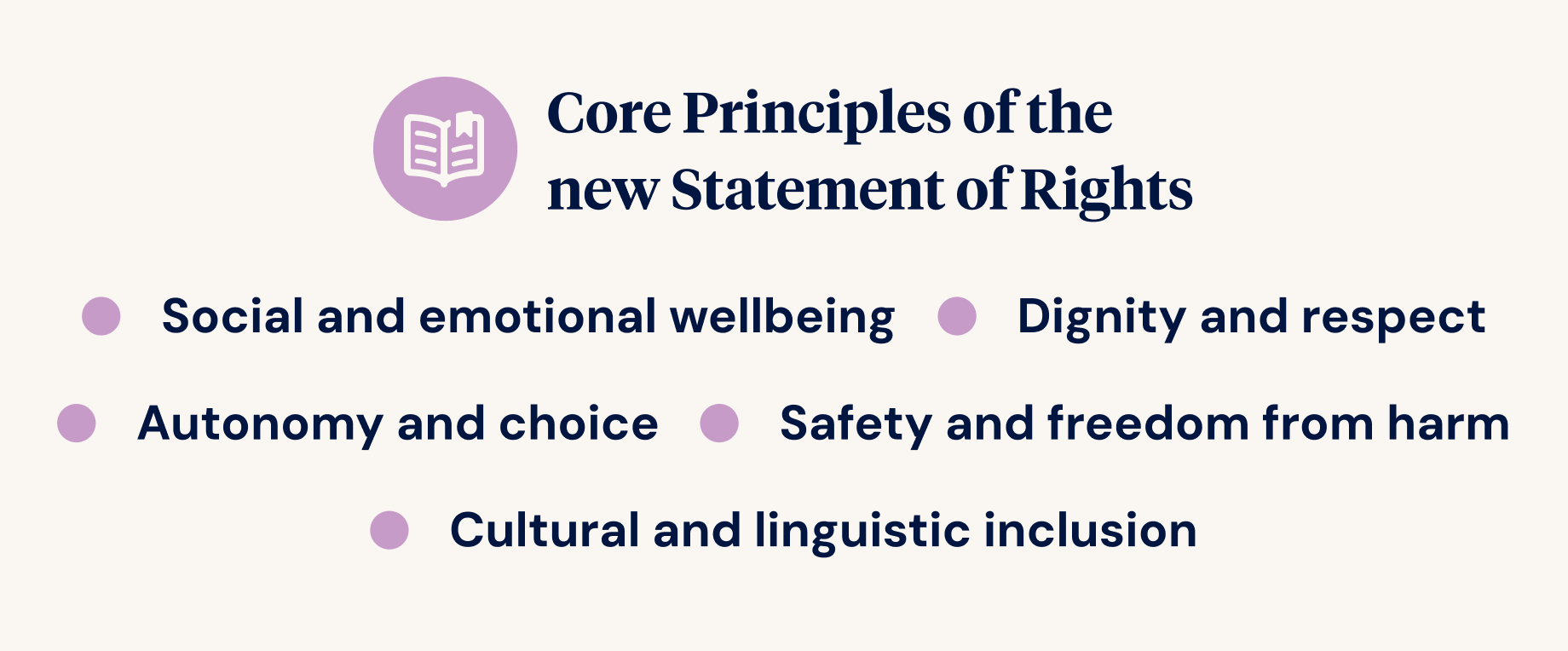Introducing the Statement of Rights under the Aged Care Act 2024 marks a pivotal moment in aged care reform. This legislated framework formalises the rights of older people receiving aged care, with a clear expectation that these rights be embedded in every care provision and governance aspect. Boards, executives, and care teams must ensure that human dignity, autonomy, and inclusion are upheld, not just in theory, but in practice.
This article explores:
- Core principles of the new Statement of Rights
- Practical implementation strategies for directors
- Accountability and enforcement mechanisms
- The impact on individuals and families
Core Principles of the New Statement of Rights
The Statement of Rights redefines care expectations through a rights-based lens. It draws from international human rights standards and the recommendations of the Royal Commission into Aged Care Quality and Safety. Key principles include:
- Dignity and respect: Residents must be treated with consideration and without discrimination.
- Autonomy and choice: Older people have the right to make decisions about their care and how they live.
- Safety and freedom from harm: Services must be safe, and environments free from abuse, neglect, or restrictive practices.
- Social and emotional wellbeing: Individuals must be supported to maintain relationships and participate in community life.
- Cultural and linguistic inclusion: Care must respect cultural identities, languages, and traditions.
- Transparency and accountability: Individuals have the right to clear information, accessible complaints processes, and responsive service providers.

These principles are legally binding. Providers must show how they uphold these rights through everyday practices such as care planning, staff behaviour, and organisational policies.
Notably, the Statement of Rights applies to all types of aged care services — whether residential, home-based, or flexible care models — ensuring that older people experience the same level of respect and protection no matter where or how they receive care.
Practical Implementation for Directors
Governance bodies play a central role in embedding the Statement of Rights. Directors must:
- Review and update organisational policies to align with the rights.
- Ensure staff training includes human rights principles, with real-life case studies and reflective practice.
- Establish board-level oversight for consumer rights, including regular reviews of rights-based indicators (e.g., complaints, restrictive practices).
- Engage consumers in governance through advisory panels or consultation groups.
- Embed rights into strategic objectives, KPIs, and reporting frameworks.
A simple board checklist might include:
- Are rights explicitly referenced in strategic and operational documents?
- Does the board receive regular updates on rights-related complaints?
- Have directors undergone training on the new Statement of Rights?
- Are staff receiving appropriate support to uphold and understand these rights?
In addition, directors must work collaboratively with clinical governance leaders to ensure that rights are not compromised during care provision. For example, the "dignity of risk" principle may require new policies around resident decision-making and informed consent.
Accountability and Enforcement
The Statement of Rights is not symbolic; it is enforceable. Under the Aged Care Act 2024:
- Providers are subject to audits by the Aged Care Quality and Safety Commission (ACQSC) to assess alignment with the rights.
- Failure to uphold rights can result in sanctions, loss of accreditation, or fines of up to $55,000 for responsible persons.
- The Complaints Commissioner has expanded powers to investigate rights breaches.
- Whistleblower protections support staff and residents in raising concerns.
New consumer advocacy programmes also support enforcement, and regulators are expected to use complaints data and serious incident reports as key indicators of rights breaches.
Directors are expected to demonstrate due diligence in monitoring rights compliance, with board minutes, policies, and risk registers used as evidence. Providers may also be required to submit documentation showing how they promote and monitor compliance with the Statement of Rights.
Impact on Individuals and Families
The Statement of Rights aims to restore trust in aged care by placing individuals at the centre. Its implementation has:
- Empowered individuals to speak up, participate in care planning, and make choices about daily living.
- Given families clearer expectations and greater involvement in care reviews.
- Increased transparency around what individuals are entitled to, helping prevent poor care or systemic neglect.
Additional Resources
- Statement of Rights
- Aged care rights and principles from the New Act
- A Rights-Based Framework in Aged Care Governance (Ausmed)
The Statement of Rights is a genuine transformative tool in aged care governance. It requires leaders to move beyond compliance and foster a culture where rights are honoured in every decision. For boards and directors, this means reshaping governance to ensure safety, dignity, and autonomy are prioritised at all levels.
When boards lead with rights in mind, they do not just meet legal standards — they raise the standard of care for every older Australian.
Author
Sigrid Piktin
Sigrid Pitkin is a Nurse Practitioner and board member with expertise in clinical governance, research, and healthcare innovation. She brings strategic insight and governance leadership to her roles on Food is Free and Climbing QTs boards.
With a background in allergy research, rural healthcare, and nursing education, Sigrid has held leadership positions at Monash University, Monash Children’s Hospital, and Murdoch Children’s Research Institute. She is also a Clinical Governance Committee member at Eucalyptus and a graduate of the AICD Foundations of Directorship program.
Passionate about equity, evidence-based care, and system reform, Sigrid combines clinical expertise with governance acumen to drive meaningful change in healthcare.



